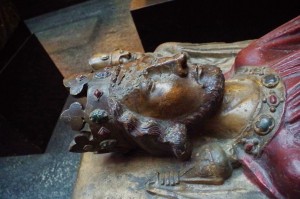A Pox on the Phony King? 800 Years On: King John & Magna Carta in Fiction
by Charlotte Wightwick
 Award-winning author Elizabeth Chadwick talks to Charlotte Wightwick about King John and her favourite books about the period …
Award-winning author Elizabeth Chadwick talks to Charlotte Wightwick about King John and her favourite books about the period …
This summer sees the 800th anniversary of a charter believed to be the cornerstone of freedom in much of the Western world. As such, the reign of King John and the events leading to the Magna Carta have long been of huge interest to academic historians and novelists alike.
John is, of course, one of the great villains of history. Even leaving aside the endless portrayals of him in the Robin Hood legend (who can forget Peter Ustinov’s cowardly lion in Disney’s cartoon?) novels such as Jean Plaidy’s Prince of Darkness (1978) and Graham Shelby’s Wolf at the Door (1975) catalogue a lurid procession of murders, kidnaps, rapes and betrayals. By this reckoning, John is variously weak, lecherous, violent, sadistic and vain, and Magna Carta comes about entirely as a response to his depredations.
For a more complex picture, Elizabeth Chadwick says, “I do love Sharon Kay Penman’s Here Be Dragons (1985) which is about John’s illegitimate daughter and her husband, Llewelyn Fawr of Wales. It paints a sympathetic view of John while not whitewashing him.” Penman shows John as a complex and often vulnerable man whose crimes result from his insecurities, but she also explores the part that the changing political landscape played in the development of the Magna Carta. What makes this novel so strong, though, is how she brings the emotional struggles of her characters to life. John’s daughter, Joanna, battles to reconcile a child’s love for her father with an adult’s understanding of his sins, and a daughter’s loyalty set against that of a wife.
Chadwick’s novels, too, explore themes of competing loves and allegiances. She has written several books covering this period. Lords of the White Castle (2000) follows Fulke FitzWarin, a rebellious baron and possible inspiration for the Robin Hood legends. The Scarlet Lion (2006) follows the later career of one of John’s supporters at the time of the Charter, the great William Marshal, whilst To Defy a King (2010) follows Marshal’s daughter, Mahelt, and her rebellious husband, Hugh Bigod. “The Magna Carta was sealed during a time of great upheaval,” she says, “and the characters I have written about have had major roles to play during that process. I have tended to see the issues involved in the Magna Carta and the personality of King John through those characters.”
She also points out that “even without the handicap of his personality, [John] was always going to be up against it, following on as he did from Richard the Lionheart. Everyone has different sides to their characters. I admire John’s indefatigable energy.” However, she goes on to explain that many of his problems, culminating in military defeat at the hands of the French at the Battle of Bouvines, were of his own making. In summary, she says: “My views on John haven’t really changed over time except possibly to take a step towards the harder line. The great William Marshal says on his own deathbed to King John’s young son Henry III, that if the child ever grows up and desires to behave as a certain wicked ancestor has done, then he wishes him an early grave… Having come to know William Marshal very well in more than ten years of studying him, I trust his opinion.”
This year is seeing a surge of interest in John’s reign, with a wide range of events, exhibitions and lectures taking place, alongside the publication of a number of new books, including Dan Jones much recommended Magna Carta (Head of Zeus, 2014). For anyone interested in biographies of the king, Chadwick has the following advice: “I am looking forward to reading Marc Morris’ new biography of King John (Hutchinson, 2015). W.L. Warren’s biography of him is excellent (1997), and Stephen Church has brought out a new one, too: King John: England, Magna Carta, and the Making of a Tyrant (Macmillan, 2015).”
For more about the commemorations to mark the 800th anniversary of Magna Carta, visit www.magnacarta800th.com.
About the contributor: Charlotte Wightwick is a reviewer for HNS. The ‘beautifully crafted opening’ to Charlotte’s first historical novel, The Lady With an Ermine, won the 2014 Faber Academy’s creative writing competition. She’s currently writing the rest of it.
______________________________________________
Published in Historical Novels Review | Issue 72, May 2015






